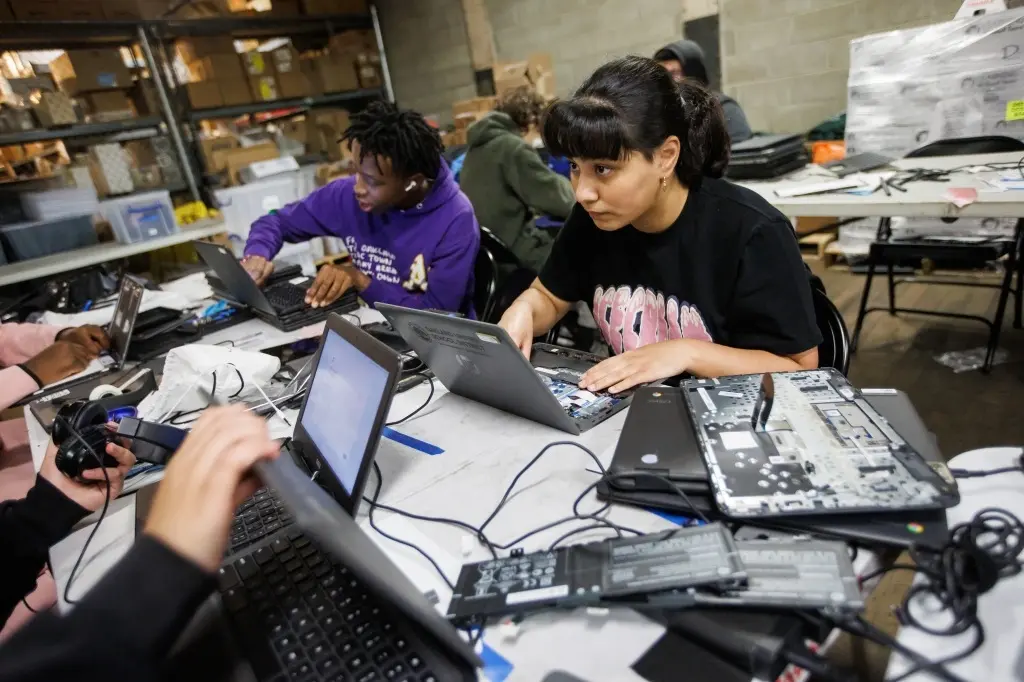There are few things quite as emblematic of late stage capitalism than the concept of “planned obsolescence”.
Good, maybe that will get them to stop using Chrome OS in schools, it has been a disaster for computer literacy in general.
Not just schools. PCs have been on the decline against phones and tablets for ages now.
If they don’t have them at home, they won’t learn shit about them.
Hey Mike Judge should make a movie about this
I agree that this is very bad on google’s part of course, however I don’t think the schools should just lie down and take it. As others have said, installing their own OS should be the way to go. It doesn’t need to be 1 person manually installing the OS on each laptop, there are Infrastructure automation tool like Ansible that can, once set up, manage installation and configuration of an arbitrary number of devices. All the device needs to do is launch a web browser from what I understand, and pretty much every linux distro should be able to do that. If they choose one with a friendly DE, then it makes it easier to use for the kids. The devices will most likely run much better on an OS without bloatware too.
“These updates depend on many device-specific non-Google hardware and software providers that work with Google to provide the highest level of security and stability support,” said Peter Du, communications manager for ChromeOS. “For this reason, older Chrome devices cannot receive updates indefinitely to enable new OS and browser features.”
Bull. Shit.
Fuck these Corporations, the only reason for this is to get the public school systems to constantly buy new chromebooks.
Weeell “bullshit” is easy to claim but not necessarily untrue. So with android phones this is definitely a problem. Industry wide firmware support for these ARM SOC-s are often ranging from not long enough, to fucking atrocious. You get basically two years of new drivers, and a security update maybe. The way LinageOS manages to support phones like the note 3, from like android 4, to 11, is basically creating manifests, that use drivers from newer, still supported, but “similar-ish” components. And the note 3 was a flagship device, easily the fastest phone of it’s generation. These Chromebooks, especially the ones schools can and do afford, are built to the penny. There is ultimately no point in pushing a software update to a device for a significant cost, that makes it so slow that no reasonable person would ever consider using it.
What is the solution to this? Hard to say. Not buying hardware so incredibly obsolete that it has to run an alternate OS, is a start. Maybe just use PC-s and deploy linux.
The solution is to let people use the device in any way they want and can. Software should not dictate hardware obsolescence.
If I’m reading this correctly (and you need to read between the lines a bit), it’s not that they literally don’t work, it’s that they aren’t capable of getting security updates. For playing Minecraft, who cares, but schools are legally obligated to keep private student information (like all their schoolwork) secure.
It’s not like there’s a LineageOS for Chromebooks and standardized firmware and drivers that can be easily deployed and updated. They mentioned in the article that open source alternatives were trialed, but that they lacked needed features and were very costly (in time, presumably) to get working.
This is just a shit sandwich all around.
From another perspective, several schools I’ve worked at have had so much vandalism and theft of Chromebooks that they won’t even consider replacing them with more costly future-proof tech. It doesn’t matter if they get 8 years of software support if students break most of them in years 1-3.
It’s not like there’s a LineageOS for Chromebooks and standardized firmware and drivers that can be easily deployed and updated. They mentioned in the article that open source alternatives were trialed, but that they lacked needed features and were very costly (in time, presumably) to get working.
You can run Linux on them, it’s the cost of getting a bunch of shitty ass chromebooks done that’s not worth it for schools.
But they kinda sorta do. It is not like Chromebooks are locked down like an iPhone. I had an old Samsung Chromebook, you could just turn off trusted boot with a flick of a switch (okay it did reset your device), and just run what you wanted. It’s just with arm based stuff running what you want is not trivial. You run what you can which is often nothing.
FYI Most Chromebooks are Intel CPU computers, there are a few arm based ones but majority are Intel x86_64.
I have an 8 year old iPad that can still use Amazon video and can still run Netflix, and google drops support for these computers as early as 3 years. I’m not an Apple fanboy but that is absolutely ridiculous.
I have a Mac Mini that has to be dumped because Apple is no longer providing OS updates to it. Just because you can continue to use it doesn’t mean it’s a good idea to do so. iOS and OSX are being increasingly targeted especially as the inertia against upgrading systems that work just fine is highest among the technologically illiterate.
What year is the mini from? I run a Plex server off a 2010 Mac mini.
Apple devices are serviceable for far longer after the OS stops updating than windows/android devices in my experience. But regardless, Apple doesn’t discontinue support as early as 3 or 4 years. Even you have to admit that is ridiculous of google.
has to be dumped
OpenCore Legacy Patcher, Linux, ChromeOS Flex, and maybe even Windows 10 could all be options for that Mac. As-is ot would still be perfectly safe to use offline too.
Huh? I have an ipad mini and since two-three years ago it’s as useful as a brick, Apple doesn’t allow me to install any app because they require a newer os version (that’s not available for the model)
By contrast my much older nexus 7 can still use most apps that I want
It can’t run everything obviously but the fact that my nearly 10 year old iPad can handle video streaming still and these schools have bricked laptops after 3 years is ridiculous.
Those Chromebooks aren’t bricked. They simply don’t get chrome updates anymore, even if it’s just Linux+Chrome and updates could continue forever without any real effort from Google
For security issues they can’t give to students unsupported hardware. The discontinued iPad would go in the same e-waste bin, because it’s not like android where browsers will continue to get updates for years and years
For a school they functionally are. They can’t use them if they can’t get security updates.
and instead the ipad that doesn’t get security updates since 2018 in your example doesn’t count?
Well for starters it wasn’t purchased by or for schools so no. But even if it was, it gets far more than 3 years of support. I think 5 is somewhat reasonable if we’re just going to accept this sort of behavior.
Either way the comparison is not really apt. Mobile devices are far worse about this than PC’s. You should instead compare a macbook (or a cheap windows machine), which gets security updates for 7-10 years. Google knows their devices are very popular for school computers, so to treat them like mobile devices and enforce the terrible standards that comes with is pernicious.
Apple does the same thing if you don’t already have those installed
My 2nd gen Apple TV is garbage. Nearly all the apps fail to load now. 🤷♂️… I suppose I can try jailbreaking it but it sure feels like someone is trying to force me to upgrade my hardware.
That’s a product that hasn’t had an Apple update since 2014. What realistically do you expect hardware manufacturers to do with actually old hardware? Lose money supporting it forever? This is kind of the opposite case from the chromebooks.
I have a 15 year old laptop that can still browse the web and play YouTube videos just fine because PC is a standardized platform with an open standard bootloader and a BIOS/UEFI system designed to abstract the hardware so the OS doesn’t have to be tailor-made to the hardware. Mobile devices are absolute shit in this regard. Why does the OS have to be specifically built to target one particular device?
It shouldn’t. End of question. This applies to Android, ChromeOS, and Apple devices equally.
I’m glad mobile Linux is starting to take off and there seem to be some standards emerging around ARM booting, even if it is still an absolute shit show compared to the standardization of UEFI/BIOS on x86/x86-64. I know some ARM systems can UEFI boot but it’s few and far between still so most devices still need a tailored kernel at least. That said, ARM Linux doesn’t need the entire freaking stack tailored to a device like Android and iOS do.
Couldn’t agree more. Every computer I have, no matter how old, can connect and do most things fine.
I will give credit to Apple on that one because android phone manufacturers are now supporting their phone for longer because of how long Apple is supporting them.
I remember back in the day when I had apple devices where they would push updates for devices long past their capability to actually run the updated software. Rather than refuse the update or get a pruned patch with security fixes only, it would force updates and bloat your phone and grind it into unresponsive unusability after a few years.
I hear that’s not so much the case anymore, so that’s nice. But I remember. The main reason I upgraded my phone was because of that, the hardware was great, but I could hardly use the software anymore even after clean installs.
My point being, I guess, extended support is great if managed properly but it can also become a bludgeon with which to drive you toward the new generations of devices.
long past their capability to actually run the updated software
Well, Apple intentionally slowed those devices down to make the users update, instead of using an insecure device, that would’ve provided a good experience otherwise.
And these days Apple is retiring devices arbitrarily for profits too. For example this year they are retiring the Iphone 8, which has better hardware, than the ipad 2018 that is still being supported…
That slowness was, at least officially, for the battery health. Do you have the support to prove otherwise?
These conversations bring the weirdest people out of the woodwork. I remember talking with a guy who explained to me how crap Apple laptops were because you (according to him) can’t customise them. Turns out he’d never owned or even used an Apple laptop. I was like, why do you care?! Especially about something you have no experience with!
The problem is that those people often can’t read. Everyone has a biased opinion or two they forgot to back up with support, but those people can’t be argued with. I want to know how to talk with them.
And then if I recall correctly (though I can’t be bothered to look) didn’t they get sued for slowing phones?
So people were mad that their phones battery wasn’t holding a charge anymore, “im being forced to upgrade”, so Apple throttled older phones to keep the battery running, aka allowing people to keep their phones longer, and then they got sued for slowing down phones lol.
I am an apple fan boy, I wont hide that. But it does seem like they tried to do a “good” and make peoples phones last longer, and then got sued.
Also the whole forced upgrade just isn’t apples game IMO. Do they want you buying the new one every year, of course. But the more important thing is that you keep using AN iPhone at all. Stay in the ecosystem, stay in the app store, stay paying for icloud, etc.
Going to a new phone gives the user a window to move away from IOS. (Though most won’t haha)
Actually yes. I bought a brand new -discounted old stock- Iphone 4s for my mum near the end of the ios 8 cycle. The day before we installed ios 9 on it, it had okay performance and good battery life. Following the update to ios9 the performance went to complete shit. (the battery remained usable for 2 more years after, but it was not a good experience for her)
How does that prove that it was not for your battery health?
I think the more probable reason is that EU regulators were unhappy with this for a long time and have now put 3 years of OS updates and 5 years of security updates into law. Low cost Android manufacturers don’t care what Apple does.
You’re also not a giant customer who needs security and it services like a school district. 3 years might be early, idk, but in plenty of enterprise or institutes replace their hardware every so often.
My 2012 laptop runs windows 10 perfectly fine and has the latest security updates. We’re way past the point of using hardware limitations as an excuse for companies to drop support early.
I don’t see why a school should have to replace their basic computers with an equally basic computer after 3 years unless it’s broken beyond repair. I don’t think the OS itself is doing much more than what an enterprise copy of windows does for security.
The only reason Windows 11 can’t run on super old hardware is because of the misleading decision to require secure boot (a feature of the motherboard that stops unsigned OSes from booting). The metaphor I use is that it is like a car radio manufacturer refusing to let a car radio work in cars that don’t have car alarms then calling the radio secure because of it.
The secure boot requirement can actually be circumvented pretty easily
Give me the deets please 👍
Yeah, Windows 11 is a bad example of supporting old hardware because Microsoft stupidly and maliciously requires secure boot and TPM2 just to lock out otherwise fine hardware from using Windows 11. You can run Win11 without secure boot or TPM2 with mods, the hardware is perfectly capable.
Or just put Linux on it. Linux runs on damn near everything because it’s designed to run on damn near everything. There’s no profit motive to only support Linux on the newest and shiniest devices like there is for Apple, Google, Samsung, and even Microsoft (who sells most copies of Windows preinstalled on new PCs).
Why are schools pushing so hard for enslaved Linux laptops?
Easier to manage for IT would certainly be my bet, and appealing cheap contracts. Even those Acer Aspires so many schools used were double the price of these Chromebooks, so suddenly youre talking about nearly halving a ~$100k cost. Schools want things locked down and enslaved, they couldn’t care less that they are Linux under the hood. They don’t think like you and I.
Right? It’s basically short term thinking on the school’s part.
All of these machines make for decent Linux laptops. I picked up an EOL Chromebook for $35 last year and installed Debian on it. Decent little machine. Not terribly fast but very useable.
These are Linux laptops. But yes, they’ll work better if you put your preferred distro on them.
I turned one into an Emacs machine, it was £20 and I fucking love it. It’s built like a tank too. It’s a dell Chromebook 11.
deleted by creator
Good to know. Is it still a PITA to make the firmware let you change the OS?
Mine was really easy (dell chromebook 11), just followed the instructions and I had no problems. I have another chromebook with an amd chipset that I can’t change the firmware on though (last time I checked), so if you’re planning to buy one to convert make sure you actually can do it first.
Most modern ones it’s just commands you have to run. You can usually find an easy walk-though on the MrChromebox website. I haven’t seen one that required a jumper or anything in a LONG time.
Those are great for hosting a Ubuntu server (as long as they are not CPU intensive). You can buy a dongle to connect it to the router for Ethernet, then add a SD card or connect a hard drive by USB and it’s quite solid. There’s a few tweaks needed but it’s an incredible learning experience.
Anyone got a non-paywalled version of the article?
If you are on ios device, using safari, tap the link and, you have to quick, tap the AA at the far left corner of the safari search (URL bar) while page is starting to load.
Sorry! I didn’t realize it was paywalled because I could see the whole thing. Hopefully this should work:
Anyone know where I can buy or place bids on batches/pallets/etc of them? I want to self host a bunch of shit using those cheap computers that are being thrown out.
Sourcing Chromebooks from the Reviving Chromebooks with Ubuntu I posted elsewhere
easiest looks like just calling the IT department of your local school
This sounds like there’s a market for a Linux distro that behaves like ChromeOS and can be centrally managed.
The problem comes down to education institutions. I remember when we got Chromebooks in my highschool (8 years ago) admins forgot to turn of developer mode and half the school unenrolled the Chromebook managing to bypass all restrictions. This went on for half a year until one day our school needed to run a state exam (more for measure of schools performance not as a college entrance exam or anything).
The computerized testing program required deploying a specific chrome app accessible when chrome book is logged out (can’t just download from chrome web store). When they tried to push the client since half of Chromebooks were unenrolled it failed. This required the school it to recall pretty much all chrome books to manually re enroll all of them and disable developer mode (prevents unenrolling and prevents sideloading Linux).
Problem is if older Chromebooks are used for Linux in an educational environment there would be nothing stopping a student from whipping up a bootable USB and dumping another distro (bypassing restrictions). I’m also not sure if there is a enrollment mode equivalent Linux (there may be but not sure).
At least that’s my two cents (not a school it admin just a memory from the past 😉).
Problem is if older Chromebooks are used for Linux in an educational environment there would be nothing stopping a student from whipping up a bootable USB and dumping another distro (bypassing restrictions). I’m also not sure if there is a enrollment mode equivalent Linux (there may be but not sure).
They could just disable booting from USB drives in the bios and password protect it. They could install something like Fedora Silverblue, or even customize the image used to include whatever modifications they want. Any changes they made to the image would be propagated through autoupdates. Kids wouldn’t have root, so they couldn’t forcibly install a different OS. Of course they could install flatpaks to their home directory, which is probably something administrators would want to prevent, but a knowledgeable student can always find ways to do what they want.
This of course requires schools/districts to hire people to manage that stuff, which could be a problem.
Good point. I wasn’t sure if Chromebooks had a normal bios with password protect/option to disable USB boot for non chrom os operating systems.
(prevents unenrolling and prevents sideloading Linux)
Should note that it’s not completely foolproof, I know because I bypassed it. It’s just not easy and technically you can get in trouble for it. Never got a ‘vacation’ for it though 😕
I never really understood the need for that strickt controll of the hardware… Who cares if Linux is sideloaded or if students unenroll. Imho I think if you need that strickt controll you are bound to get so many unnesseary issues down the line. Instead let student 6se what ever the fuck they want and for security just make sure they WiFi/ethernet is secure and locked down and any services the students need are behind a secure 2fa login. Treat any device as untrusted is more healthy for your security in the long run imo. If students need special software that they can’t run on their own machines you can lend them a machine for that specific task for a specific time. Problem solved.
I never really understood the need for that strickt controll of the hardware
Federal laws and rules for educational technology:
CIPPA - https://www.fcc.gov/consumers/guides/childrens-internet-protection-act
COPPA - https://www.ftc.gov/legal-library/browse/rules/childrens-online-privacy-protection-rule-coppa
and to an extent
FERPA - https://www2.ed.gov/policy/gen/guid/fpco/ferpa/index.html
Actually in your case our school has a BYOD program (bring your own device) in which you can bring your own laptop with whatever flavor of OS. Firewall would restrict you, your device would be considered untrusted, and in testing a loaner locked down chromebook would be provided. The issue comes with non BYOD devices.
Now lets assume a school has 1k students. If they allowed os unlocking and allowed students to tinker with the os. Then they would need 2k chromebooks 1k unlockable 1k locked down for exam administration (assume the whole school needs to take it at the same time). From a admin/IT perspective why should the school need to pay double the number of chrome books just for a few students to install their favorite brand of linux.
Even under the best circumstances where support queries aren’t increased (from students softbricking/ not knowing how to use linux) and say they are able to preserve 1k unlockable chromebooks, admins would still need to replace the other 1k locked down chrome books at end of software to stay in compliance with testing software (negating any financial benefit).
It’s because the school district is responsible for how the devices are used. If your kid gets around the content block and you, an ultraconservative, finds your kid watching porn, you are definitely going to do something about it.
And of course blame the school instead of the child at fault, naturally…
You blame the school instead of your parenting which is at fault*
Usually kids “misbehave” in public because of close-minded parents or parents who try to control their kid too much, and most of all parents who don’t encourage good behaviour correctly. Parents really like to blame their kid for behavioural issues when in reality they’re the reason it’s a problem. (Especially with e.g. people who have disabilities like Bipolar, Autism, ADHD, parents internally blame their kid for everything and punish the kid, even though the disturbances caused by the disorders are something you can address and help the kid with with good parenting)
I suspect most of the kids who do that kind of stuff are neurodivergent and either undiagnosed or not treated correctly by their parents and not given proper treatment
No way it’s the schools fault if the kid sidloads anothe os. That should strip the responsibility and it’s the parents problem. Ultraconservatives can just stfu. about this.
It should, yes. But that’s not going to stop them from trying. Enough noise from a “concerned parent” will make something happen more often than not.
This is why we can’t have nice things
Awful!!! I remember using those junktops when I was in high school…
Made me realize I still have one lying around and I tried to put Linux on it, but they seem to only let you sandbox Linux in it…? Not able to enter BIOS supposedly due to the firmware is obnoxious. Is there any way to put coreboot on over the firmware or something?
At a guess - they’re likely selling those laptops at a loss and making the money back on (hopefully) service contracts or (probably) selling your data. As soon as you install a custom OS they won’t support you (so you won’t buy support) and they won’t be able to sell your data.
Most Chromebook’s firmware is Coreboot, but it’s running a Depthcharge payload instead of UEFI (or BIOS or whatever). Mr. Chromebox maintains UEFI Coreboot payloads and install tools for a wide variety of (x86) Chromebooks, which can be used to flash a normal UEFI payload and boot normal OSes. It’s strictly possible to boot normal Linux systems on a the Depthcharge payload modern Chromebooks use, but uh… here’s the gentoo wiki on it, it’s a substantial pain in the ass.
Yep I did that to my school Chromebook, they never asked for it back when I graduated and being a broke college student I decided to UEFI flash it and use it as a cheap Linux Computer, still using it now. It’s not the fastest laptop but it’s certainly good enough. It’s really dumb that they enforce software expiration dates on these PCs when they’re probably fully capable of running the next version perfectly fine.
Chromebooks expire? What the fuck? Are there logistical problems with installing Linux on these devices?
Chromebooks are unfortunately meant to be disposable like phones. Nobody should buy one, but unfortunately schools get them because they’re cheap.
On an individual basis you can install Linux, but for millions of devices thrown out by schools around the world, there’s no solution because the residual value is so tiny, you’d have to pay the techs minimum wage and hold a gun to their heads to get enough devices per hour to justify it.
I used to work at a refurb place and when we saw a chromebook that wasn’t immediately OK (it could’ve had a bad display or keyboard, or locked to an account), we just removed the eMMC, smashed the chip and threw the device on our scrap pallet.
Phones shouldn’t be disposable either, I’m coming up on five years on mine.
They shouldn’t be, but they’re designed to be, especially Androids with their abysmal software support period.
I guess mine is unusual then. I still get very regular security updates, and battery life though noticeably shorter, well, it’s still okay.
Give them to the kids with a QR code guide sticker about installing Linux on them? I’m not a kid, but I would love if someone “threw” a couple of these in my general direction.
Almost certainly not allowed, schools are responsible for privacy and security on these devices.
Any standard desktop linux is more private and secure than google spyware
And as soon as the IT guy at school installs Linux on these machines, he’s responsible for said privacy and security. And he’s a lot easier to sue than Google if something goes wrong.
This is exactly why right here, cost aside.
I would not hand out hundreds of Chromebooks to kids running some Linux distro I installed even if I could. It’s critical to have full manufacturer support in these types of environments.
Most of these Chromebooks are 3-4 years old and in really rough shape. Kids use these things for literally everything. You likely wouldn’t even want them for free. Probably bio-waste at this point.
A friend asked me to fix their daughter’s desktop and also asked if she could borrow an old laptop to use in the meantime. The desktop was disgusting with food smeared all over the keys and display. I cleaned it up and fixed it and sent it back. My laptop was returned with food smeared everywhere after just a few days. I was stunned.
Comments upon comments ignorant of the realities of the privacy laws governing this domain and the implications on firmware, driver and OS security support. “Just install Linux on it” is a completely unworkable solution. As some have pointed out, the places where this is done have a much thicker IT departments staffed with higher grade professionals to make it work. The thing to be mad here about is the shit support from vendors across the stack. If I had to guess, the worst offenders are probably the SoC vendors who typically ship firmware and driver updates as is the tradition.
I mean, even if just installing a different OS were an option, you’d need to install and setup that OS on a few hundred computers or more. I used to work for a place that would essentially do the enterprise enrollment in bulk before shipping off the computers to schools. I could only setup a bit under 100 over an 8 hour workday, assuming no major issues (like captchas on the login step, or the wifi going out). Keep in mind that we also had specialized little microcontroller* USBs specifically for doing all the enrollment keypresses, and enough of those for someone to setup multiple computers at once.
I am actually curious as to how you would make a locked down managed linux OS akin to ChromeOS. Maybe there would be a way to do something like that that’s also faster to setup, but idk.
*centipedes are the name for the ones we used.
That’s exactly the problem. The standard GNU/Linux distro isn’t suitable to allow carrying the responsibility that an innumerable number of users with physical access won’t be able to pwn those machines. Machines that are used by others too. You absolutely can make an OS like that out of Debian or Ubuntu, or what have you. Google has - Chrome OS - but it’ll take a significant development effort. You’d have to basically redo at least some of the work they’ve done. And let’s say you did all of that. Then you end up deploying it on an ARM-based fleet. And there’s a wild vulnerability in the WiFi firmware blob, and the SoC vendor no longer supports it. Every student has root and we’re back to the original problem. 👨🚀🔫
And that’s why instead of getting hardware from a vendor and hoping for the best, you might want to get it in writing that they’ll support their crap till a date. Then you stamp that as the EOL date for that laptop and you present it as part of the spec to whoever might want to buy this laptop. There’s no escaping this problem unless there are no proprietary blobs on the system, which is unlikely for ARM, or you have a solid development team and you’re large enough to have a source sharing contract with the vendor that lets your team fix the vulnerabilities and support the hardware for as long as you like. It’s probably much easier to achieve on x86, which costs more per unit up front.
Thank you for sharing your experience along with that link.
I am actually curious as to how you would make a locked down managed linux OS akin to ChromeOS.
Because Linus Torvalds stupidly refused to change the Linux license to GPL3.
What difference would the kernel licence make in this context?
Yeah, bulk imaging computers is really only limited to how many you can hook up to the network. I used to have to image hundreds of computers a day at times, and really the longest part was walking around and restarting them all so they’d PXE boot. The actual process maybe took 2 hours since all the computers were on 100Mb/s connections.
I converted one of these Chromebooks to Linux as a test project and the results were, not good.
To start, they have a bootloader lock screw under the motherboard, so you have to take the entire laptop apart to load anything but unsupported ChromeOS.
Then you have to use a Google tool, can’t remember the specific one, to swap the bootloader. That might be possible to automate but I didn’t look into it because…
… The hardware sucks. We’re talking like 4GB of storage on a lot of these Chromebooks. The driver support is all over the place, and there are issues everywhere even on “supported” distros.
With the vast amount of junk Chromebooks out there, I’m sure community hospice support will get better, but it’s never going to be an easy bulk conversion because of how common the bootloader locks are.
Not sure why everyone is so upset. This is nothing new. Has been happening for years with phones and tablets. They get at least 5 years of updates, which I think is pretty good. My kids have had the same CBs at their schools for 6 years and still going strong. Some of my laptops don’t last that long.
-
To me it isn’t acceptable that phones and tablets have that problem too, especially devices that could still have a decent performance.
-
Windows has a lot of problems, but at least if you have Windows you will be supported for a long while, even if it gets slow due to Windows being Windows. Considering ChromeOS frames itself as a competitor of especially low end Windows, and that ChromeOS is more optimized than Windows, I would expect more.
EDIT: The article says three to six years, and that they stop functioning. That’s even worse.
EDIT2: And like most phones, you can’t flash another OS to most chromebooks.
I agree it’s not nice, some phones are abandoned within a year or two.
I believe the CB will just stop receiving updates, it will still work. Over time there may come issues due to missing updates.
-
Not sure why everyone is so upset
Because it’s upsetting. The fact that it has been upsetting for years doesn’t make it no longer upsetting.
The attitude that old news shouldn’t be upsetting enables upsetting behavior. And, quite frankly, I find that upsetting :-)
I agree it could be better. But there’s nothing I can do about it so I’ve learnt to not get upset by such things. I can’t get upset by everything.
Fair, but I’m just saying, we can still catagorize upsetting things as upsetting, even if, personally, we’ve achieved equanimity with respect to our inability to effect any immediate change.
Agreed, well said :)
5 years is shit. People have been conditioned over the past 10-15 years to think that the mobile way of doing this is the correct way. Before that, your PC was an open system that you could upgrade and update until it was incapable of running the latest software due to hardware limitations (not enough RAM, GPU API level, processor extensions, etc). These days the mobile companies have convinced people that none of that matters. The software is so intrinsically tied to the hardware that even if the hardware is not much different to the new hardware, the new software won’t work.
A 15 year old PC can still do a lot of work on a modern OS these days. Why can’t a 6 year old phone? Because the people who want you to buy a new phone said so.
Not even that, computers don’t work wit enough CPU, GPU RAM, are easily interchangeable
Companies making mass market devices should be required by law to support them indefinitely, or until they publish the technical specs sufficient for community support and repair.
The upgrade cycle they’re allowed to get away with today is not only a ridiculous drain on people’s money, but also a shameful source of pollution and waste.
until they publish the technical specs sufficient for community support and repair.
I want to see phones with no further official OS support have their boot loaders opened up so a lightweight OS can be installed on them instead. I’ve had iPhones in the past that have been absolutely rock solid after a battery replacement that lost iOS support, and with that a whole bunch of resale value. So I now tend to sell mine a year or so before they’re likely to be dropped.
But I genuinely think that I’d hold on to an iPhone that could have an alternative OS installed. This is, of course, why none of the major manufacturers allow this. Gotta put the profits ahead of the ethics.
Exactly, bootloader locking should be downright illegal. If EU wants to make phones last, they need to mandate that you can unlock the bootloader (WITHOUT bullshit like having to get an unlock code from the manufacturer). Want to lock it down for certain software features like payments, etc? Ok, fine, I can live with that, so long as I can unlock it if I so choose and keep all HARDWARE functionality intact.
On another note, the manufacturers should be upstreaming and mainlining their drivers in the Linux kernel. ChromeOS and Android are both built on Linux, yet they keep all their hardware support in forks and branches that are left to wither and die rather than submitting those changes upstream. Only a select few ARM SoCs have mainline support. If the companies would just put a bit of extra effort into doing things right rather than the shitty hack jobs they do now to get products out the door as fast as possible, we could have a much better ecosystem around old phones. Of course, the shittiness is by design.
Actually in the Android community Sony helps you unlock your bootloader and offers official AOSP sources for their devices that you can compile and install yourself.
I have no idea why people are enamored with Samsung.
Ad campaigns, most likely. I always seem to see ads for Samsung phones, but not as often for Sony brand ones. I do agree Sony does a much better job about opening up the bootloader, versus Samsung punishing you for trying to open your own paid for device up.






























